We started this look back at the original Vertigo Preacher series by remembering how we felt about Preacher wayyyyyy back when it was the new hotness. Our opinions were … mixed, to say the least. That installment concluded with Graeme, whose opinions were distinctly un-mixed, asking Jeff to please explain why people lionize this book despite its many, many problematic elements. And we resume with Jeff trying to do exactly that.
JEFF: There are a lot of reasons why people lionize Preacher, and I think if there’s one thing we can feel comfortable saying as Election Year 2016 kicks into gear, it’s that apparently a lot of people are still totally into Kevin Smith aping Tarantino directing a Donald Trump speech. As Matt said, it’s totally a #PROBLEMATIC fave, but that’s true of so many things out there in the world. The ‘90s were actually a pretty quiet time where a lot of America’s chickens hadn’t come to roost, and the Internet was far from pervasive.
In times like that, it’s no surprise there was more of a hankering for transgression, which included stuff like Preacher, and Fight Club, and even Jackass: men were trying to figure out why they felt displaced without anyone being really down to talk about class issues (always a tough topic for Americans to discuss), and so there was a lot of “I feel angry and pointless; maybe if I ride this shopping cart down some stairs and staple my friend’s scrotum to a cardboard box, I’ll feel better.”
This is actually why I get a little hand-wringy when people complain today about SJWs or Tumblr telling us to check our privilege or whatever: back in the ‘90s, a lot of the transgressive mainstreaminess had a mean frat boy vibe to it, a sense of disquiet and disgust against people who were different from the white guy norm—people of color, people of different sexual orientation, women—obscured by the willingness of the people perpetrating to debase themselves as well. How could they be accused of flinging shit at minorities or women when they were also smearing it on themselves?
At its best, this allowed for some good and necessary catharsis—Tarantino’s use of racial slurs is problematic but I’d still argue it’s being used in service of trying to connect with and portray black culture—and at its worst…well, it smuggled a lot of hate speech in an ironic wrapper which made it all that much harder to address and disarm. It didn’t challenge anything; it just reinforced people’s conservative values while exploiting their voyeuristic need to see something they’d never seen before.
All that said, I don’t think Preacher really ends up falling on either side of that spectrum. It’s neither cathartic nor inflammatory…but maybe that’s because as a straightish white guy, I’ve got the privilege of dismissing the homophobic bullshit as Ennis’s own issues that really couldn’t convince anybody of anything.
ALL OF THAT SAID, though, I think I have to disagree with your characterization of Preacher as “long[ing] for a Great American Myth that never existed, and it hates the world around it for not living up to the lie,” since I think a book where there are two mythic cowboys, and one is someone’s imagined incarnation of John Wayne and one is The Saint of Killers, a cowboy so in love with killing he becomes the divine apotheosis of murder, clearly is trying to do more about the Great American Myth than longing and hating.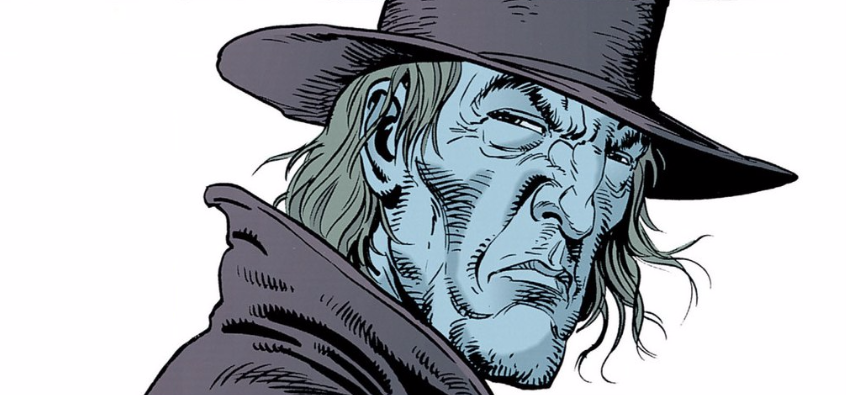
Ennis is trying to pull apart that Great American Myth, to openly acknowledge the genocidal truth behind it, but also make a case for why the myth itself is important. It’s not something that gets covered until way down the line (and spoilers for those who haven’t read the whole series) but part of why Jesse and Cassidy end up the way they do is that Cassidy doesn’t have the values Jesse does, the values embodied by good ol’ John Wayne.
Without those values in place, Jesse could end up exactly where Cass does. We need the Great American Myth, according to Ennis: we need the idea of an individual unafraid to stand alone, who does so for the greater good. If we don’t have at least that—and according to Ennis, we really don’t need anything more than that—it’s just a slow slide into nihilism and/or asshattery.
Which actually brings up something I noticed on this re-read—Cassidy doesn’t quite fit that mold in the early issues here. Before he goes on to become more of a crazy fuck-up, the Cassidy we see here is actually the guy who comes to Jesse and Tulip’s rescue, despite Jesse calling him an abomination, and one whose interest in Tulip is flirtatious but seems far more cavalier than it becomes later.
Matt, do you think I’m misreading this early characterization or did it stand out to you too? Based on the start here—and I gotta say, I do appreciate having twelve issues in one volume, instead of just one arc—and what you can remember of where it ended up, how much do you think Ennis stuck to the ideas for this series when he started and how much did he either course correct or just flat-out change his mind?
MATT: Y’know, I really don’t know. I think it’s deliberate on Ennis’s part–I think he introduces Cassidy as a familiar “loveable rogue” archetype with the thinking that it’ll read differently in light of later revelations. I don’t think it works, and (if I’m being honest) I’m really not sure I can point to anything that leads me to believe that, but it’s how I feel.
I found something related to that pretty striking: I really, really didn’t like Cassidy on this readthrough. Some of that is that he, like so much else in this book, probably speaks a lot more directly to kinda-assholish 19-year-olds than to middle-aged suburban dads. But my favorite arc in the series (now and back then) is the Jesse origin story that makes up the back half of this volume, and it’s only on this reading that I found myself wondering if maybe Cassidy’s absence from that storyline is a big part of why.
Even aside from his later heel-turn, Cassidy is a character without much motivation, without much depth, who also serves to undermine the nominal lead. (Jesse gets markedly dumber whenever Cassidy’s around to immortal-splain things to him.) For all the ways in which the book still works for me (despite the many reasons that it shouldn’t), Cassidy might be one that has aged the worst.
I do think that trying to find too much meaning to the book’s message or morality or approach to the Great American Myth may be ascribing more to the story than is actually there. Everything that works for me in this book is pot-boiler stuff, a propulsive if picaresque narrative that gets by on glibness and cartoonish bad guys and a bit of the old ultra-violence (and, later, a bit of the old in-out-in-out). Whenever it tries to really wrestle with something, it generally just bogs down the story. Ennis may be ATTEMPTING to Say Things and Make A Point, but he’s at his best when he’s wringing melodrama out of a one-eyed young man who will never get to marry his sister because he happened to see someone have sex with a chicken.
I left this re-read with a lot of questions that hadn’t occurred to me before, including but not limited to “Wow, our heroes really don’t seem to care about the entire congregation of dead normal people, do they?”and “Are we meant to believe that the sheriff recounts the gunfight shot-by-shot (as the skeptical Fed talks about counting the gunshots in his retelling)?” But maybe the biggest was “How the hell can this possibly make a TV series that is in any way enjoyable?”
Obviously there are going to be some major changes across the board, but … I’ve gotta be honest, I left this re-read thinking that if the show is even remotely faithful to the book, it’s going to be unwatchably bad. I just don’t see any way that these elements can work onscreen, no matter how they’re reconfigured.
Either of you have a clue how this could possibly become something that America wants to spend 60 minutes with every week?
GRAEME: In my great cynicism about the American Public, I have to admit that I don’t think that a straight adaptation would be something that would cause a lot of problems with the television audience. Remember, we live in a world where AMC’s The Walking Dead is held up as a shining example of everything that’s great about the current state of TV drama.
That said, I don’t think we’ll get a straight adaptation — I think The Walking Dead is a good indicator of what we should expect: something that takes the high concept and characters from the TV show, but basically goes its own way in terms of specific plots, albeit with echoes of the original comic book storyline. Considering that Seth Rogen is one of the executive producers, I doubt that the TV show is going to shy away from… shall we say, a certain male humor, and even if I’d like to believe that we’ll lose some of the more obvious homophobia and/or “Southern Folk Are Dumb And Inbred” elements, I wouldn’t be too surprised if there’s a lot that’ll end up remaining in there, only to be proclaimed as progressively edgy by certain critics.
I’m interested in what Jeff said about Ennis’s deconstruction of the Great American Myth, and not just because I don’t think he’s really doing that much deconstruction — I’m pretty sure, but can’t swear to it, that I’ve not finished the series, so maybe I’m missing some deep nuance at the tail end. I think that you’re giving Ennis a lot of credit for things you’re reading into things, Jeff, but I’m happy to be wrong — because one of the things that really grabbed me about this re-read was how… cliched everything felt. With the exception of our main trio, everyone felt like they came from a punchline of a stereotyped joke, which is weirdly fascinating to me. Is this part of an Americana re-examination, or the product of less enlightened times?
Maybe it’s neither, of course; Matt’s line about Ennis “wringing melodrama out of a one-eyed young man who will never get to marry his sister because he happened to see someone have sex with a chicken” sticks with me because I can’t shake the feeling that that is the ultimate appeal of Preacher, 20 years later, exactly the kind of faux-transgression that the 1990s were full of — part of a throughline that goes from Kurt Cobain’s confused posturing through Oliver Stone’s Natural Born Killers and all those things you mentioned, Jeff: Jackass, Fight Club and the like. A shock-jock approach to pop culture that has a lurid, obvious appeal. Maybe we’re all reading too much into it…?
(And now I’m wondering about the crossover between Preacher and Kevin Smith’s Dogma, and why do I keep drawing lines between Ennis and Smith?)
I’m really curious, you two: I came into this re-read thinking Preacher was not for me, and left it feeling, if anything, more entrenched in that belief. But you both had much fonder feelings towards it — I’m reminded of a recent Invisibles re-read I had when I went from “This Is The Great Book Of The 1990s” to “Well, At Least Grant Morrison Meant Well” in almost every single area. Did you come away from this still fans of the series? Did you end up thinking, wow, I was so much more trusting as a reader back then?
JEFF: Unfortunately, you can’t cross the same river twice. I felt pretty burned by the way Preacher wrapped up the first time, someone catalyzed by the book’s diminishing returns and disappointing character turns into a former fan.
So I entered into this read-through with a certain degree of glum resignation. What was interesting to me is to read this work and feel that, even if Ennis hasn’t moved very far from his original interests, his writing has gotten tighter, sharper over time.
People may remember me raving about the way The Boys ended up–not only did it seem like a stronger re-do of the Preacher finish, but it also had very clear thematic signposts along the way and a really deep backstory, there amongst all the comical sodom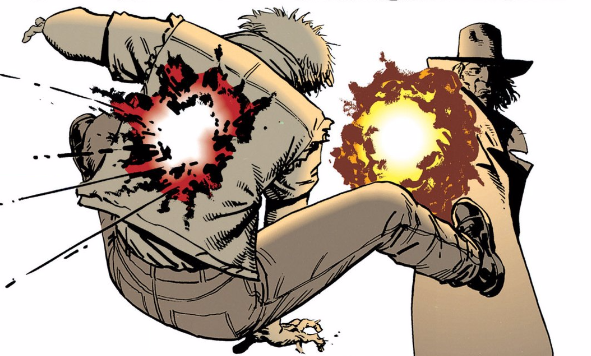 y and immature relationship drama–but it was interesting to read stuff here that just didn’t land, or wallpapered over plot holes, or whatever.
y and immature relationship drama–but it was interesting to read stuff here that just didn’t land, or wallpapered over plot holes, or whatever.
So part of me, even though I’d still characterize myself as a former fan, is kind of into reading the rest of this, strictly from a quasi-process junkie kind of way. Was Cassidy always supposed to make his heel turn, or did he grow organically from a Mary Sue character into the (supposedly) complex moral failure he becomes later? Did Ennis manage to hit a sweet spot in his dialogue, or is there always something a bit clunky I’m erasing after the fact?
I gotta admit: I’m tempted, although one of the things I do miss about reading these things in trades–as I do with Morrison’s Invisibles–are the letter pages, which were some of my favorite in comics, ever.
As for the TV question–well, we’ll see. It’ll either hit big or miss horribly, although that has just as much to do with the public’s relationship with Seth Rogen/Evan Goldberg material, which it either loves or is completely indifferent to, as it does to the source material. But I think the material itself could work if adapted correctly–I definitely don’t think you could do most of it straight out of the book.
And no offense to both of you, but you really think Ennis set up a story with two opposing cowboy figures in it but for no thematic purpose whatsoever? I’m kinda shocked you both have so little–I”m not sure what the right word is–regard for Ennis as a writer. Or is it the book itself?
For real: if I’m reading too much into it, what do you think those two cowboys stand for?
In Part 3: we try to answer this piercing question!
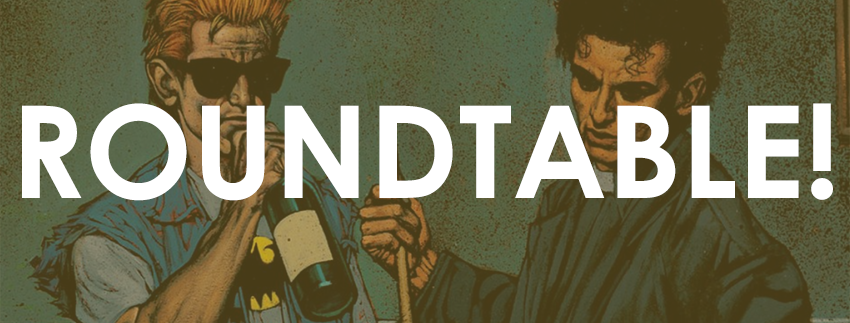
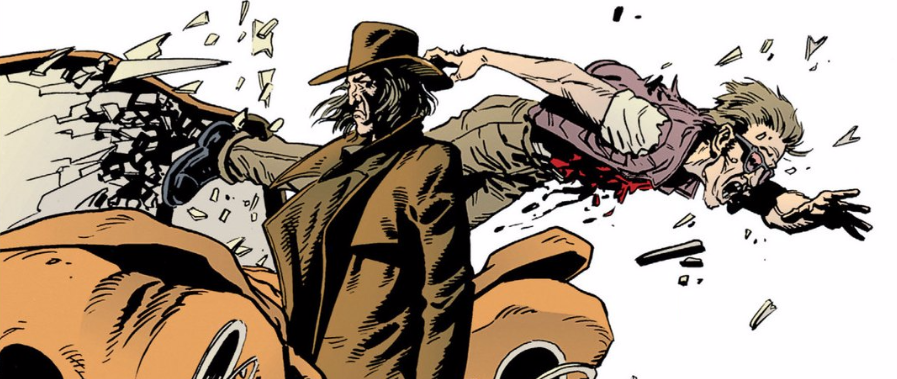

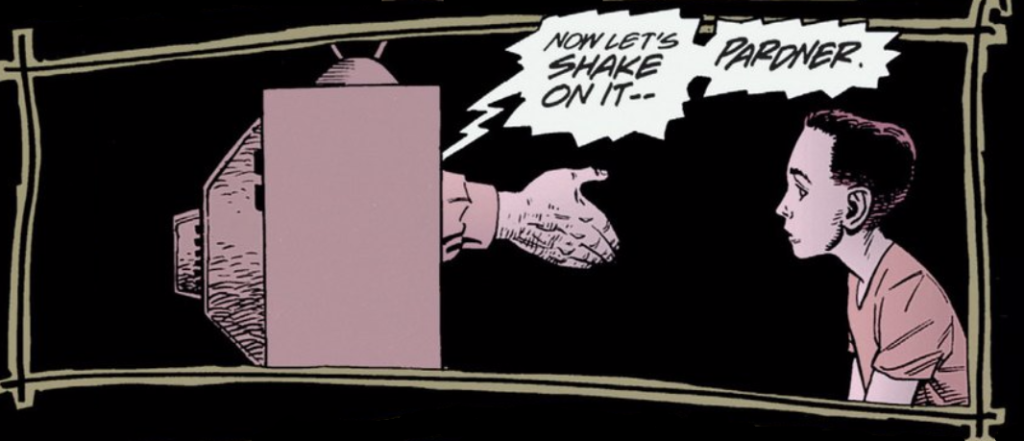

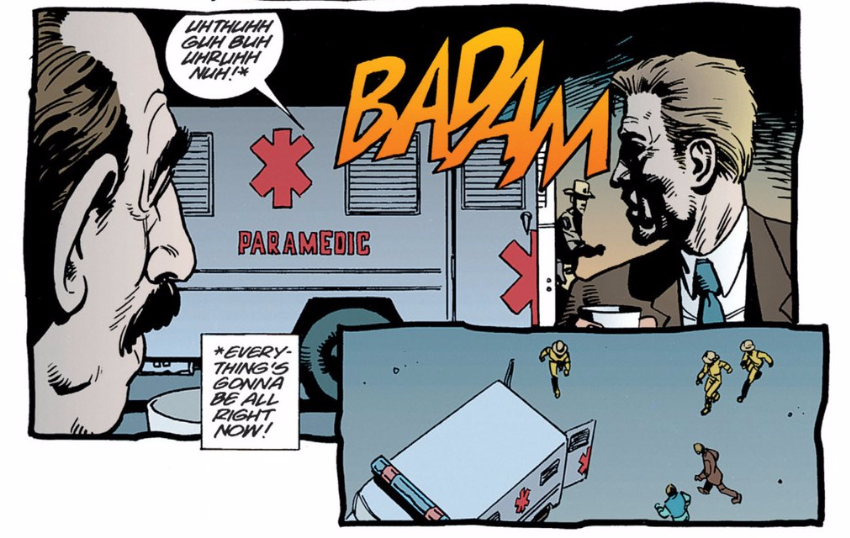


Preacher = shock-humor + violence + bro-heart. I’m enjoying the conversation but I don’t see why the appeal is a mystery. I wouldn’t adapt it straight (even trying for “un-P.C>,” the homophobia is inexcusable) but I think the tv show could still be transgressive (or even faux-transgressive) enough to keep the appeal of the comics.
I loved the series from the start, even that preview in Absolute Vertigo. At its best, Preacher kicked ass! Did I mention I was 16 when it came out and it was my first non-Big 2/ licensed Dark Horse comic besides Sandman? That I was 21 or 22 when it finished? That I was a big fan of Tarantino, Kevin Smith, etc.? I reread it a few years ago and had many of the same reactions you guys are having. The sex jokes are not okay, and the treatment of religion and romance are juvenile (but perfect for disaffected Catholic teenage-me). I still have nostalgia for the series and think the good stuff lands. Ennis became a better writer (especially in his concurrent series, Hitman) while not losing all his tics. Ultimately, I wish it was better, and can’t see giving it to a new reader…
… unless the new reader is a hetero teenage boy.
Yeah, I enjoyed this in back when I was a kid, but even then had some serious issues with it, and those issues have only grown in stature as time has passed. Looking back at it now, it really is the definition of a sophomoric work. The best thing about it when it came out in the 90s was that it really was a breath of fresh air – out of that context, not so much. What’s amazing is that Ennis is basically still up to the same tricks (with diminishing returns) in The Boys – relying on gross-out ultraviolence, male bonding, and (I hope, unconsciously) use of queer attributes to signify evil or at least characters we should not respect. Though The Boys at least is better plotted and has a significantly more intriguing and subversive ending.